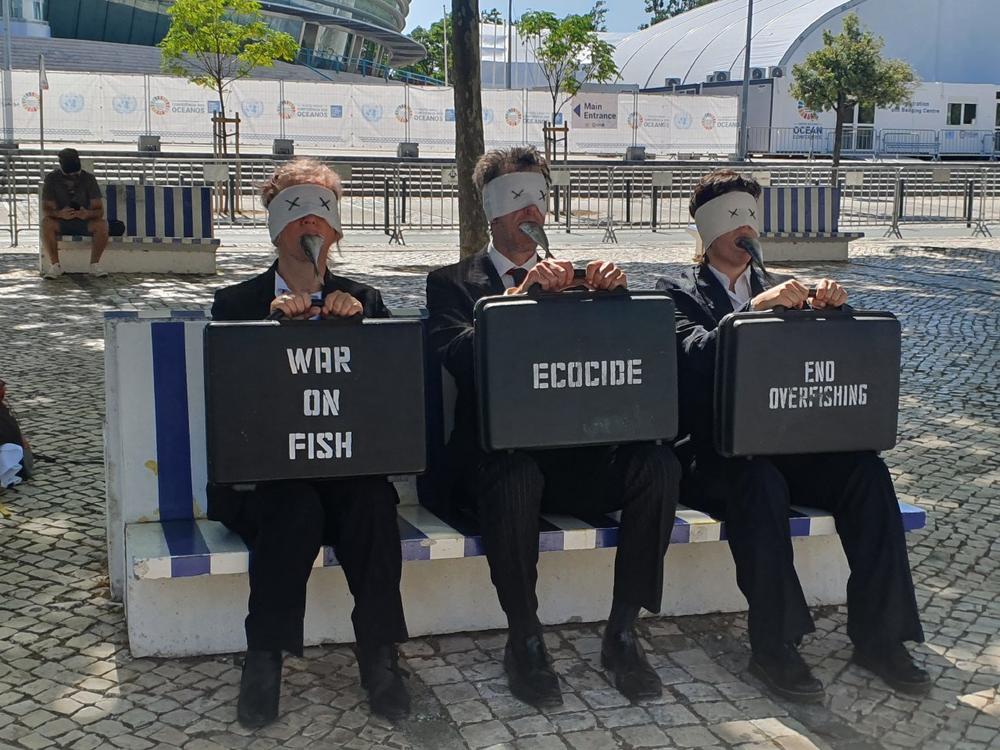MSC’s Fisheries Standard is meant to provide a framework within which the environmental impacts and effective management of a fishery can be assessed before it can use the MSC blue tick label. Consumers trust that the label — affixed to more than 20,000 products globally — represents seafood caught sustainably and ethically. However, the coalition fears that the label will continue to be awarded to fisheries that routinely catch vulnerable animals, waste excessive amounts of sea life, damage ecosystems and catch overfished species.
Early drafts of the new Standard generated optimism, as they included a requirement for scientifically peer-reviewed levels of independent observation of most fisheries, which would have ensured both a greater understanding of and ability to mitigate fisheries impacts on species at risk. To the coalition’s dismay, the final Standard removed these proposed requirements for all fisheries except those on the high seas.
“The recent Fisheries Standard Review process provided a historic opportunity for the MSC to drive real changes in global fishery management throughout the next decade, especially with regard to requirements for increased monitoring and compliance,” said Shannon Arnold, senior marine program coordinator of the Ecology Action Centre. “Like many parts of the final Standard, the MSC’s intentions were on the right path. On the surface the scoring metrics are stronger, however, the devil is in the details and those details ended up including loopholes, opt-outs, and weak definitions that will undermine the certification intentions.
Throughout the review process, the coalition had challenged MSC to strengthen its requirements for the protection of Endangered, Threatened and Protected (ETP) species, and is pleased that the final Standard has strengthened the requirements to reduce fishing impacts related to these species. However, underlying definitions included in the Standard related to ETP species are concerning. IUCN “Vulnerable” species — a critical ask from Make Stewardship Count — have been left out. The new Standard could also result in some economically valuable fisheries targeting ETP species being awarded the MSC’s blue tick, as assessment bodies will be allowed to modify a number of the ETP definition requirements based on the application of criteria that the coalition feels are not sufficiently precautionary.
A notable positive in the scorecard is the requirement for MSC fisheries to have a policy in place that sharks must be landed with their fins naturally attached to their bodies.“We have requested ‘Fins Naturally Attached’ as a prerequisite for certification and welcome that MSC will finally introduce this globally acknowledged best practice, with no exceptions,” stated Dr. Iris Ziegler, head of international cooperation at Sharkproject. “However, without mandatory levels of compliance monitoring, the risk is that this will be mostly a paper exercise and not drive real changes for sharks on the water, especially since most fisheries will have until 2028 — six years from now — before having to comply with the new requirement.”
The coalition noted in its Request for Transparency Scorecard that in comparison to previous MSC Standard reviews, the FSR 3.0 review process was marked by increased communication with stakeholders and a greater number of opportunities to participate in consultations via workshops and webinars. Unfortunately, during the most critical final stage of the process — between the last draft and the final Standard release — there was only one opportunity for stakeholders to provide feedback.
“As active participants and highly engaged stakeholders, it was disappointing to have seen so much effort from MSC to improve transparency of the process, only to have it largely evaporate at the final stage of decision-making, thwarting several key improvements," said Kate O’Connell, marine wildlife consultant with the Animal Welfare Institute. “Many of the most concerning policy walk backs happened at this point, such as the weakening of required monitoring and compliance levels for all fisheries, and the decision to continue to allow the certification of fisheries that intentionally harass and kill marine mammals.”
The changes to MSC’s Fisheries Standard entered into effect on May 1, 2023.
“It is impossible to know how and if these new provisions will truly impact certifications until they are applied to fisheries over the next 6 years as the Standard is phased in,” said Dr Cat Dorey, Independent Advisor on seafood sustainability. “The MSC will be hard-pressed to ensure that its certified fisheries meet the ambitious sustainable management and biodiversity targets set for 2030 by the Global Biodiversity Framework.”
@msc_fisch/?hl=de @awionline @ecologyaction @Make_Stewardship_Count
SHARKPROJECT
Ottostrasse 13
63150 Heusenstamm
Telefon: +49 (6104) 670984
Telefax: +49 (69) 986453-30
http://www.sharkproject.org
Head of International Cooperation | SHARKPROJECT International Switzerland
Telefon: +49 (174) 3795190
E-Mail: i.ziegler@sharkproject.org
Senior Marine Program Coordinator | Ecology Action Centre , Canada
Telefon: +1 (902) 329-4668
E-Mail: sarnold@ecologyaction.ca
Marine Animal Consultant | Animal Welfare Institut
Telefon: +1 (860) 990-7858
E-Mail: kate.oconnell@balaena.org
Independent Advisor | Australia
Telefon: +61 (425) 368-323
E-Mail: catdorey@gmail.com
Chefredaktion
Telefon: 0049 6104 670984
E-Mail: s.zeiler@sharkproject.org
![]()

